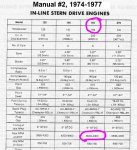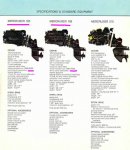So I been on the hunt for an actual maximum WOT throttle goal for the 165 HP 250 cubic inch chev I6. What an adventure. I even owned a Steury with one of those in it back in the early 80's. Unfortunately, I don't recall a thing about that motor from back then other than the carb rebuilding jobs I did on it and the props we dinged up.
From what I have found, early 70's Chevy I6 was rated low in HP and low in RPMs. By late 70's the RPM were up to 4600 on some Merc spec sheets.
Michigan Motorz says the 250 C.I. remanufactured engine produces 165 H.P. @ 4800 RPM.
Using Merc factory manuals, and my own ownership knowledge and experience....
Mercury started using the inline 6 in 1964. They ran is as a 230cubic inch, 150hp, unit for 3 years, and in 1967 it became 250 cubic inch and 160hp. 3 years later the 160 became 165, and remained as a 165hp engine until it was discontinued, being replaced by the notorious '470', in 1981 (although the 470 had already been in production for 5 years by then). In 1969 Merc also used the longer stroke version of the inline 6, the 292, as a 200hp engine. Not sure why it ran only 1 year. I've heard that it used too much fuel, but can't verify that (and it seems unlikely). The other possibility is that it overlapped and was 'poaching' sales of the 5 litre V8 (rated at 198hp)... (I think this is the more likely reason).
Used by Mercury, all inline 6s had a recommended WOT of 3900-4300rpm (screenshot of manual #1, #2 and #3, which fully covers the inline 6s, at the bottom)...
I have no idea why or how Michigan are getting the engine to spin at 4800rpm. A different cam, or higher compression ratio perhaps... :noidea: But I'd be skeptical, as it's what I'd call a 'lazy' engine. It's happy to make its maximum power lower down the range rather than scream its box off. While not a great power producer, it was a reliable engine despite being VERY old tech (not that anything coming out of Mercruiser since has been much better.

Still OHV engines. :facepalm

. The 165 did suffer one Achilles heal, gudeon knock. It never really stopped an engine, but it was an annoying knock at idle. Once the engine was doing 1,000rpm, it went away...

HTH....
Chris......


























